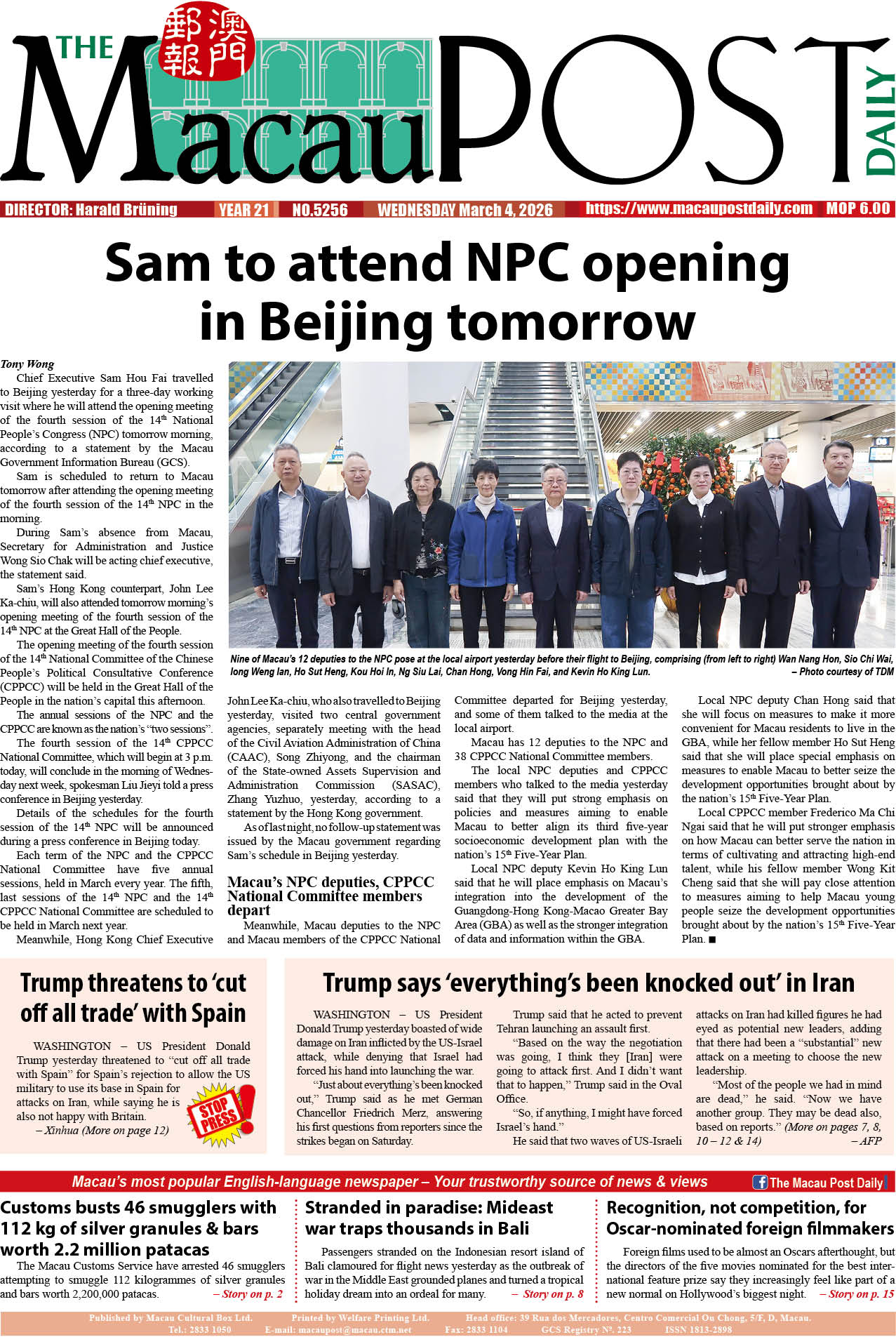The local government announced yesterday that it started to collect residents’ opinions on Macau’s participation in the development of the Guangdong-Hong Kong-Macau Greater Bay Area.
The gathering of residents’ opinions, which will end on June 28, aims to encourage civil society to take part in the development of the Greater Bay Area (GBA), the government said.The government made the announcement in a press conference at Government Headquarters yesterday. Kou Chin Hung, an advisor to the office of Chief Executive Fernando Chui Sai On, Policy Research Centre (GEP) Director Lao Pun Lap and Victor Chan Chi Ping, the government’s chief spokesman, co-hosted yesterday’s press conference.
Premier Li Keqiang’s government work report to the opening session of the National People’s Congress (NPC) in Beijing on March 5 mentioned the central government’s plan to develop a “city cluster in the Guangdong-Hong Kong-Macau Greater Bay Area”.
Following a number of regional studies back in the early 2010s, the GBA development concept first appeared in a national document in 2015, when the National Development and Reform Commission (NDRC), Foreign Ministry and Ministry of Commerce jointly released an action plan on jointly building the Belt and Road (B&R) project.
The GBA plan appeared in a State Council policy paper in March 2016, but March this year was the first time that it was included in Li’s annual work report.
Commentators have pointed out that the GBA will comprise three starkly different Chinese jurisdictions – Guangdong, Hong Kong and Macau.
Addressing yesterday’s press conference, Kou said the central government was now drafting a plan about the development of the GBA, adding that the local government has been involved in the drafting of the plan.
According to Hong Kong news reports, the National Development and Reform Commission, in close coordination with Hong Kong, Macau and Guangdong, aims to finish drafting the GBA development plan by the end of this year.
The GBA will consist of Hong Kong, Macau and nine Guangdong cities, namely Dongguan, Foshan, Guangzhou, Huizhou, Jiangmen, Shenzhen, Zhaoqing, Zhongshan, and Zhuhai.Kou said the development of the GBA would help boost Macau’s economic diversification and improve local residents’ livelihoods.
When asked by the media whether two weeks was long enough to collect residents’ opinions, Kou pointed out that the government has already been collecting opinions from various segments of civil society about the possible ways in which Macau could participate in the GBA development since March – when Li mentioned the central government’s GBA development plan in his annual work report. Kou added that the government launched the two-week opinion collection period to encourage citizens to become involved.
Replying to the same question from the media, Lao added that if the local government collected opinions from residents for a longer period, the local government would not be able to provide Macau’s opinions to the central government for the drafting of the GBA development plan on time.
According to Kou, the government is proposing two major roles for Macau through its participation in the GBA development, namely making use of Macau’s unique advantages and promoting the complete implementation of the “One Country, Two Systems” principle.
According to Kou, the government is proposing that Macau should position itself as a world tourism and leisure centre, business-service platform between China and Portuguese-speaking countries, and “a culture exchange hub with primarily traditional Chinese culture along with its multicultural existence”.
According to Kou, the government plans to carry out a number of tasks for the GBA development, which include promoting the city’s economic diversification; supporting young people to start their own business; and studying the possibilities of Macau residents working and living in other parts of the GBA enjoying the same benefits as their local counterparts of the respective cities. Concerning the enjoyment of the same benefits, Kou mentioned as an example that Macau residents would pay the same bus fares as their local counterparts in the other cities of the GBA.
According to Lao, residents can submit their opinions through a number of channels, namely on the dedicated website http://www.gce.gov.mo/bayarea, sending an email to the Policy Research Centre at event@gep.gov.mo, as well as phoning the centre on 2883 9919 and faxing 2882 3426.
Kou Chin Hung (centre), an advisor to the office of Chief Executive Fernando Chui Sai On, speaks during yesterday’s press conference at Government Headquarters, while Policy Research Centre (GEP) Director Lao Pun Lap (left) and Victor Chan Chi Ping, the government’s chief spokesman, look on. Kou, who obtained his master’s degree in Economics from Jinan University in Guangzhou, was appointed advisor to the CE office in 2006. The CE office has about 20 advisors. Photo: Tony Wong









